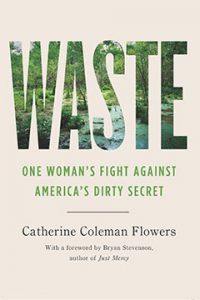Waste: One Woman’s Fight Against America’s Dirty Secret
 Waste: One Woman’s Fight Against America’s Dirty Secret, by Catherine Coleman Flowers (New York: The New Press, 2020)
Waste: One Woman’s Fight Against America’s Dirty Secret, by Catherine Coleman Flowers (New York: The New Press, 2020)
In Waste: One Woman’s Fight Against America’s Dirty Secret, Catherine Coleman Flowers interweaves her personal story from a civil rights activist to an environmental activist while exposing one of America’s dirtiest secrets: many of the poor in America are living in unsanitary conditions similar to what is found in third world countries.
Catherine Coleman Flowers was born and raised in Lowndes County, Alabama. As a high school student, she advocated for and brought about change in the Lowndes County school system’s treatment of black children. The students’ education was deliberately undermined to the point that most students were poorly prepared to go on to college.
Later Flowers became a teacher in Washington, DC and North Carolina, helping children labeled “special” or “low achievers” to get their education and gain the respect they deserved.
Finally, she returned to Lowndes County and took up the plight of the poor. She quickly realized an inequity that keeps people not only poor but also sick. The poor in Lowndes County lack basic systems of sanitation that most of us take for granted in the U.S. Poor people are being fined and imprisoned for not being able to pay and maintain the high cost of septic systems.
The soil in Lowndes County, Alabama is perfect for growing cotton. Composed mostly of clay, the same soil that made this part of the country one of the richest areas during slavery is today the cause of people’s homes continually flooding with raw sewage.
The clay soil in this area of Alabama, allowed for the roots of cotton plants to stay moist, thus allowing cotton to thrive. This same soil composition prevents wastewater from being absorbed and causes raw sewage to remain in people’s yards and homes. The soil that is good for cotton because it holds water so well is bad for domestic plumbing systems and people’s health.
Poor people in Lowndes County are living in third world inhumane conditions beyond their control and being punished for it. The cost of systems to rectify this situation is beyond the means of most of the poor, and the systems themselves once installed can and do fail. Until recently, the County would fine people for not having adequate septic systems and jail those who could not afford the fines. All of which obviously was done to keep people poor.
Flowers brings a vast array of powerful politicians, including Senator Cory Booker (who became an immediate champion of the cause) and Senator Doug Jones, who had to be won over, and wealthy philanthropists, Bob Woodson of the Woodson Center and Kit Taylor, Tom Steyer’s wife, a philanthropist in her own right, to Lowndes County and introduces them to some of the citizens of the county, all having spent a lifetime living with raw sewage flooding their homes and spewing into their yards. She has made some inroads in helping some people, mostly through funding that allows them to upgrade their living conditions. But even after testifying before Congress and winning funding for the county still, after 20 years, there is no long- term solution for this problem.
As Flowers travels throughout the world educating others about the plight of people in Lowndes County, she also learns that the problem is not just in her hometown, but exists throughout the U.S. The poor in many areas of this country lack basic sanitary conditions that for them as citizens in the richest country in the world, should be a given.
Visiting other poor communities in the U.S. helps her realize that this problem is not just about poverty, but is linked directly to the climate problem, and that if it not treated as a climate issue the situation will only worsen. Flowers then sets out to educate herself on the issues of sewage/climate change and how to deal with these issues in the long term and not just on a temporary basis. There is no simple solution.
The message of Waste is visible today in the lack of adequate sewage and clean water for the people of Texas four months after a once-every-ten-years storm in Texas, and in Florida where the leakage of toxic waste is threatening over 300 homes. Climate change and lack of preparation for what is coming continues to keep people, mostly the poor, living in unacceptable conditions.
Waste tells an interesting and important story in a very readable way. Flowers has led a fascinating life. But I sometimes wanted to know more about the people and the situations in which they were living. Hopefully, there will be an update to Waste that will provide more details and possibly what the real solutions can be.
Reviewed by Denise Shavers, a graphic designer who likes to read, especially history. She has been the administrator of the Metro New York Labor Communications Council for almost thirty years, and has handled the layout and design work for our association’s newsletter, Work History News, for about six years (and we are most grateful for her efforts in this regard!)
